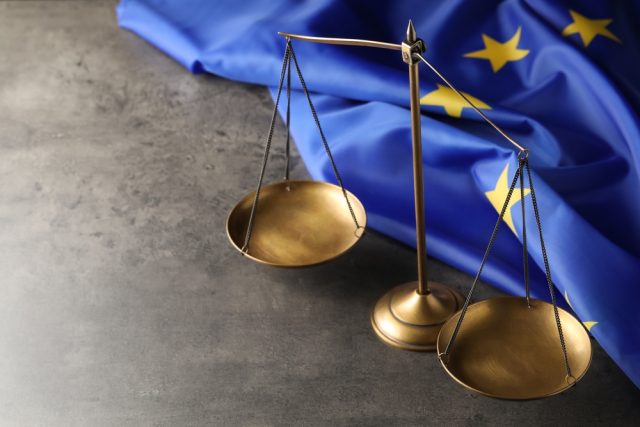
Between 14 and 24 March 2025, the Polling Europe agency conducted a poll for ECR on two very interesting and above all central issues in the national and international debate, particularly after the latest developments related to the trade tariffs imposed by the US President on the rest of the world. The two main topics, divided into several questions that we will analyse, firstly concern the perception that citizens of the various EU Member States have of their own judicial system, and then move on to an analysis of the Union’s relations with President Donald Trump.
THE METHODOLOGY OF THE SURVEY
To better understand some of the data contained in the report, it is worth starting with the methodological framework underlying the survey, which was conducted online among a representative sample of EU citizens over the age of eighteen. A total of 5,006 interviews were conducted over the ten days during which the questions were administered. These were distributed among the 27 Member States in quotas proportional to the quantitative weight of the inhabitants and equally distributed by gender and age (taking into account the most recent data published by Eurostat). Of course, some adjustments were necessary, and the Union was divided into five areas of analysis: Germany, France, Central and Eastern Europe (Baltic States, Poland, Czech Republic, Slovakia, Hungary, Romania, Bulgaria, Croatia, Slovenia), Northern Europe (Sweden, Denmark, Finland, Belgium, Netherlands, Lux., Ireland, Austria) and Southern Europe (Spain, Italy, Portugal, Greece, Malta, Cyprus). Finally, separate data – but still contained within the area of belonging – were collected for three countries: Italy, Spain and Poland. Understanding which divisions are chosen is also useful to make an in-depth analysis based on the medium and long-term relationships and dynamics between states and on the domestic front. Among the data we are going to analyse are some concerning European political groups. Analysing the method of work used is also useful in order not to fall into the error of thinking that the more than five thousand citizens interviewed have such an in-depth knowledge of EU politics that they fully understand the major political families and their specific and characterising features. In fact in the survey, when talking about the voters of the European political groups, one has to take into account that, for each member country, the citizens were interviewed on their voting intentions regarding the national parties, and then the data was recoded by declining those intentions on the European political family they belong to.
JUSTICE AND THE JUDICIAL SYSTEM
The analysis at this first juncture focused in particular on the independence of the judiciary in the different member states of the European Union. The question concerned justice, judges and citizens’ perceptions of their dependence or otherwise on the interference of political forces on the domestic front of individual countries. Looking at the raw data, before refining the analysis on individual cases, we can state with some certainty that the majority of European citizens do not believe in the complete independence of judges and the judicial system in their country. In fact, 57% believe that there is some form of conditioning by political forces, while only 36% profess their independence.
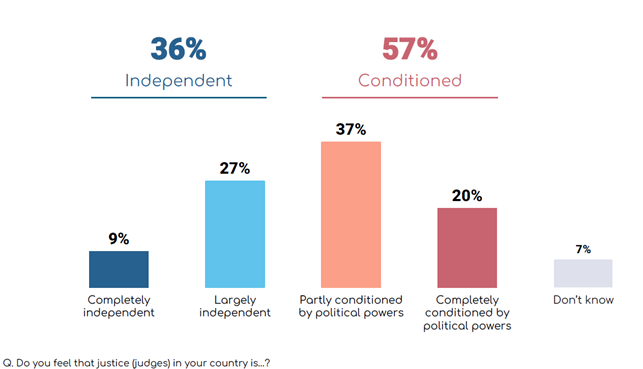
THE INDEPENDENCE OF JUDGES AND JUSTICE
Observing the arrangement of the data between the countries and areas covered by the analysis, we can easily detect a thinning on the extreme fringes: more clearly on the position of ‘complete independence’ of judges and the judiciary, as well as on the position of ‘complete conditioning’ by political forces. The distribution focuses more on the position of “largely independent”, which nevertheless remains in the minority, and on the position of “partially conditioned”, which makes up the majority of 57%. The country that believes most in the conditioning of its judicial system turns out to be Spain: in fact, 74% of the respondents placed themselves on answers linked to partial or complete conditioning. Spain is followed, with 68%, by Southern Europe (a figure undoubtedly driven by Italy and Spain), with 66% by Central and Eastern Europe (a figure that also includes Poland) and on par with 63% by respondents from Poland and Italy. The judicial system and judges are considered to be most independent in Germany (with 49%), in Northern Europe (44%) and in France (with 40%).
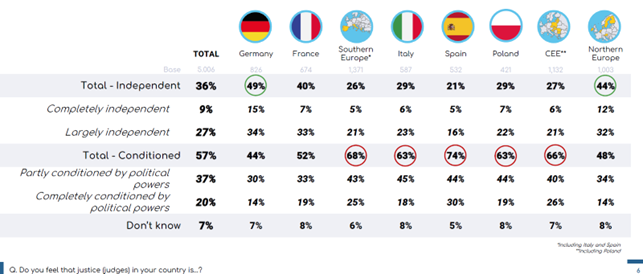
HOW MUCH DOES POLITICAL AFFILIATION MATTER?
The poll proposed by Polling Europe also aims to give a political affiliation to these data, also dividing the answers according to the European political family to which the respondents belong. In this way, it is easy to see that the percentages of those who are in favour of the complete independence of the legal system are to be found in the Greens (47%), in Renew Europe (48%) and in the EPP (43%). Percentages that are, however, outweighed by those of the ECR (73%), European Patriots (68%) and ESN (71%), who instead point the finger in the direction of the political conditioning of judges and the judicial system.
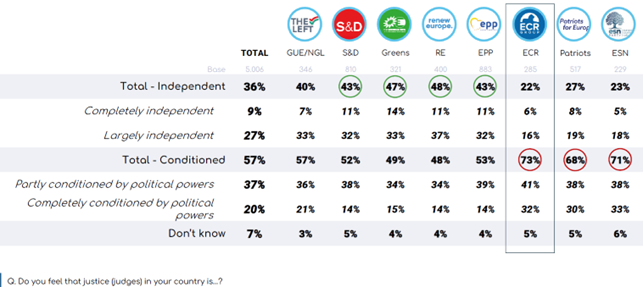
TRUST IN THE JUSTICE SYSTEM
Another question within this first section of the survey concerns citizens’ trust in the justice system. Here too, the percentages shifted towards positions of mistrust (with 50% of respondents), while 46% placed their trust in their country’s judges and political system. This is also in contrast to the number of respondents who believe there is political interference in the system.
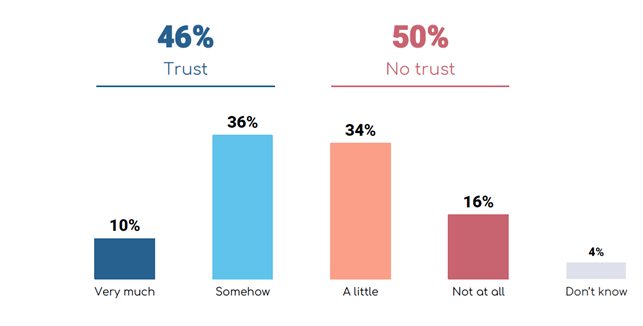
Again, looking at the distribution of the data, one can see a thinning in the bands representing the extreme positions, while the figure representing the highest confidence in the justice system comes from Germany with a figure of 55%. Sceptical towards the real functionality of the system are the Central and Eastern European countries (60%) and once again Spain (58%). A mistrust, that of the Iberian country, that is evident in all the questions posed so far.
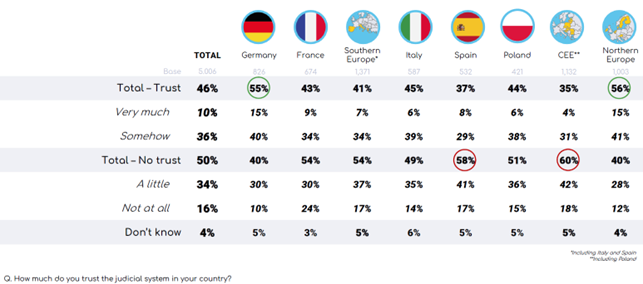
THE DIVARIANCE BETWEEN PROGRESSISTS AND CONSERVATIVES
The respondents were then asked about their voting intentions in a national context, so that the data could then be coded into the European households to which they belonged. As with the first question, greater scepticism came from conservative, populist and far-right groups, in particular with ECR at 68%, the Patriots at 63% and ESN at 67%. More confidence is expressed moving to the left, again with the Greens (60%), EPP and the Party of European Socialists S&D at 57%.
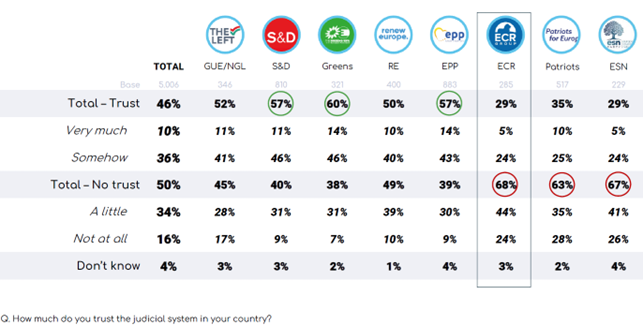
In the final analysis, it is clear that trust in the judicial system and in the independence of judges certainly varies according to the political orientation of the respondents and their geographical origin. In particular, it seems to be the EU Member States in the North that are most confident in the quality of their judicial system. At the same time, in the East and in the South there are the most sceptical countries. A split that also relates to political affiliation, with the more Eurosceptic European households tending to view the work of the judiciary with distrust, while respondents closer to progressive positions tend to believe more in the independence of judges. These positions are also easily ascribable to national specificities and events that may have characterised individual Member States and their judicial systems in recent years. Blatant cases of corruption or miscarriages of justice may be at the basis of a negative response in terms of trust, whereas a long judicial tradition and a system considered stable and far from the possibility of external interference (be it political or of other nature) certainly leads the respondent to consider the work and independence of judges with greater confidence.



 Subscribe
Subscribe